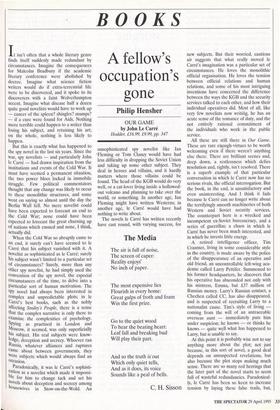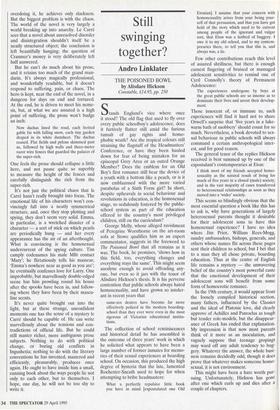BOOKS
A fellow's occupation's gone
Philip Hensher
OUR GAME by John Le Carre Hodder, £16.99, £9.99, pp. 347 It isn't often that a whole literary genre finds itself suddenly made redundant by circumstances. Imagine the consequences for Malcolm Bradbury if the academic literary conference were abolished by decree. Imagine what science fiction writers would do if extra-terrestrial life were to be discovered, and it spoke to its discoverers with a faint Wolverhampton accent. Imagine what disease half a dozen quite good novelists would have to work up — cancer of the spleen? shingles? mumps? — if a cure were found for Aids. Nothing more terrible could happen to a writer than losing his subject, and retaining his art; on the whole, nothing is less likely to happen.
But this is exactly what has happened to the spy novel in the last six years. Since the war, spy novelists — and particularly John le Cane — had drawn inspiration from the institutions and events of the Cold War. It must have seemed a permanent situation, the two power blocs locked in immobile struggle. Few political commentators thought that any change was likely to occur to these monolithic structures, and some went on saying so almost until the day the Berlin Wall fell. No mere novelist could have been expected to forecast an end to the Cold War; none could have been expected to forecast the great churning up of nations which ensued and none, I think, actually did.
When the Cold War so abruptly came to an end, it surely can't have seemed to le Carrd that his subject vanished with it. A novelist as sophisticated as le Cant; surely his subject wasn't limited to a particular set of circumstances? Surely, more than any other spy novelist, he had simply used the convention of the spy novel, the especial circumstances of the time, to delve into a particular sort of human motivation. The SPY novel had always been interested in Complex and unpredictable plots; in le Carres best books, such as the nobly affecting Smiley's People, there is a sense that the complex narrative is only there to examine the complexities of psychology. Spying as practised in London and Moscow, it seemed, was only superficially his subject. His real subjects were know- ledge, deception and secrecy. Whoever ran Russia, whatever alliances and ruptures came about between governments, they Were subjects which would always find an occasion.
Paradoxically, it was le Carre's sophisti- cation as a novelist which made it impossi- ble for him to change tack and set his novels about deception and secrecy among housewives in Stow-on-the-Wold. An unsophisticated spy novelist like Ian 'Fleming or Tom Clancy would have had less difficulty in dropping the Soviet Union and taking up some other subject. They deal in heroes and villains, and it hardly matters where those villains could be found. The head of the KGB would do very well, or a cat-lover living inside a hollowed- out volcano and planning to take over the world, or something. In another age, Ian Fleming might have written Westerns; in another age, le Cane would have had nothing to write about.
The novels le Carre has written recently have cast round, with varying success, for new subjects. But their worried, cautious air suggests that what really moved le Carre's imagination was a particular set of circumstances. He loves the monolithic official organisation. He loves the tension between official relations and human relations, and some of his most intriguing inventions have concerned the difference between the ways the KGB and the security services talked to each other, and how their individual operatives did. Most of all, like very few novelists now writing, he has an acute sense of the romance of duty, and the not entirely rational commitment of the individuals who work in the public service.
All these are still there in Our Game. These are rare eu,ough•virtues to be worth welcoming even if there weren't anything else there. There are brilliant scenes and, deep down, a restlessness which defies resolution and, rightly, isn't resolved. There is a superb example of that particular conversation in which le Carre now has no serious rivals, the official interrogation. But the book, in the end, is unsatisfactory and even uninteresting. And I think it fails because le Carre can no longer write about the terrifyingly smooth machineries of both Western and Soviet security services. The counterpart here is a wrecked and incompetent ex-Soviet bureaucracy, and a series of guerrillas; a chaos in which le Cure has never been much interested, and in which he invests little energy.
A retired intelligence officer, Tim Cranmer, living in some considerable style in the country, is made aware by the police of the disappearance of an operative and old friend, an uncontrollable left-wing aca- demic called Larry Pettifer. Summoned to his former headquarters, he discovers that his operative has absconded not only with his mistress, Emma, but £37 million of Russian money. Larry's Russian contact, a Chechen called CC, has also disappeared, and is suspected of recruiting Larry to a nationalist cause. Tim's style of living coming from the will of an untraceable overseas aunt — immediately puts him under suspicion; he knows — or thinks he knows — quite well what has happened to Larry, but is unable to say.
At this point it is probably wise not to say anything more about the plot; not just because, in this sort of novel, a good deal depends on unsuspected revelations, but also because the plot stops making much sense. There are so many red herrings that the later part of the novel starts to seem full of wasteful redundancies. Paradoxical- ly, le Carre has been so keen to increase tension by laying these false trails, but, overdoing it, he achieves only slackness. But the biggest problem is with the chaos. The world of the novel is very largely a world breaking up into anarchy. Le Cure sees that a novel about unresolved disorder and disintegration shouldn't itself be a neatly structured object; the conclusion is left beautifully hanging; the question of Cranmer's money is very deliberately left half answered.
But he can't do much about his prose, and it retains too much of the grand man- darin. It's always magically professional, and wonderfully readable, but it doesn't respond to suffering, pain, or chaos. The hero is kept, near the end of the novel, in a dungeon for days on end and tortured. At the end, he is driven to meet his neme- sis, but, at what we are assured is a high point of suffering, the prose won't budge an inch:
Now dachas lined the road, each fretted gable fat with falling snow, each tiny garden draped in its white dustsheet. The dachas ceased. Flat fields and pylons skimmed past us, followed by high walls and three-meter razor wire fences that guarded the palaces of the super-rich.
One feels the prose should collapse a little here, and not pause quite so superbly to measure the height of the fences and carefully distinguish the rich from the super-rich.
It's not just the political chaos that le Can€ hasn't really brought into focus. The emotional life of his characters won't con- vincingly fall into a neatly symmetrical structure, and, once they stop plotting and spying, they don't seem very solid. Emma, in particular, is a wretched disaster of a character — a sort of stick on which pearls are periodically hung — and her every appearance has the air of an afterthought. What is convincing is the homosexual undercurrent of the spying culture. Tim camply codenames his male MI6 contact `Mary'; he flirtatiously tells his masseur, 'Emma's nowhere near as good as you are'; he eventually confesses love for Larry. One improbable, but marvellously double-edged scene has him prowling round his house after the spooks have been in, and follow- ing where they have been by their mascu- line scents.
It's never quite brought out into the light, but at these strange, unconfident moments one has the sense of a mystery le Carre should be capable of. He can write marvellously about the tensions and con- tradictions of official life. But he could still master richer, more ambiguous prose subjects. Nothing to do with political change, or boring old conflicts in Ingushetia; nothing to do with the literary conventions he has invented, mastered and efficiently, pleasurably, produces once again. He ought to have inside him a small, cunning book about the ways people lie not only to each other, but to themselves. I hope, one day, he will not be too shy to write it.



























































 Previous page
Previous page